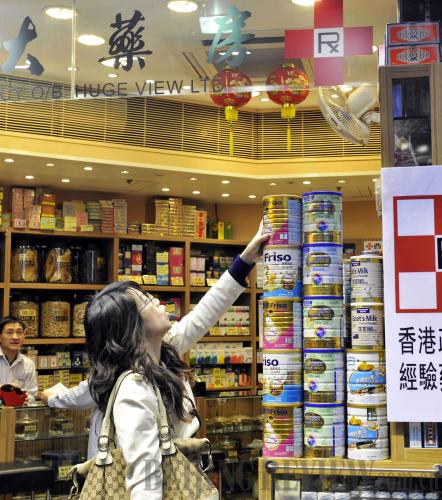|
 |
|
CRISIS OF TRUST: Due to a lack of trust in domestic milk powder, many Chinese mainland consumers go to Hong Kong for imported milk powder (XINHUA) |
Imperfect System
Sensen Orphanage was a private orphanage in Chongqing Municipality, taking care of vagrant children who begged in the streets. But, in early 2010, the orphanage had to close because of the lack of official approval.
Sensen Orphanage was not the only one to meet this situation. Several years ago, a private organization focusing on assisting handicapped orphans in Shandong Province was shut down by the local government for the same reason. This case highlighted the embarrassing conditions facing private public welfare organizations. China's current regulation demands, if a private organization is to operate, it must attach itself to a governmental department. But many of these organizations found it is difficult to do so.
Chinese Minister of Civil Affairs Li Liguo said last year civil affairs need the help of private organizations. He also blamed some local governments of not fully mobilizing social forces in dealing with public welfare affairs.
The minister's criticization was to the point. Local governments in some places should try to create favorable environment for private organizations, helping them to play effective roles in the country's public welfare cause.
The Beijing News
Antibiotics Misuse
It is reported the Chinese Ministry of Health is to release standards on dosages of antibiotics, and hospitals exceeding limits will be demoted.
This policy implies serious overuse of antibiotics in China's medical system. Statistics show one third of adverse drug reaction reports in China are related to antibiotic medicine.
Doctors know patients always hope to get well as soon as possible, and naturally antibiotics will be the first choice. Most patients know little about the risk of antibiotics abuse. So, even if they are ill with only a headache or cold, they want to use antibiotics, forgetting that recovery from disease is a certain process. As a result, antibiotics are increasingly frequently used because of the growing resistance to drugs of pathogenic bacteria.
Compared to ordinary medicine, antibiotics are much more expensive. It is easy for hospitals to take advantage of this large price gap in order to make bigger profits. Thus, to relieve Chinese patients from over-dependence on antibiotics, first the medical system needs to be reformed. Also, doctors' moral codes need improving.
Beijing Times
Good Way for Protection
China's Ministry of Culture is planning to establish a withdrawal mechanism for state-level intangible cultural heritage properties. In the future, a regular evaluation will be done to examine whether those state-level intangible cultural heritage items are protected well. If any items fail to pass the evaluation, they will be excluded from the list of state-level intangible cultural heritage.
Meanwhile, from 2011, the Central Government's annual subsidies to intangible cultural heritage inheritors will be raised from 8,000 yuan ($1,194) to 10,000 yuan ($1,492) a year.
China has made great achievements in protecting its intangible cultural heritage. However, many problems also occurred. In some places, intangible cultural heritage properties are used as an economic resource and are excessively exploited. As a result, intangible heritage properties are not being rescued or protected.
Undoubtedly, the withdrawal mechanism will help to cool down the blind craze for intangible heritage application and encourage local governments to carry out tangible protective work.
Xinmin Evening News
Consumer Trust
Recently journalists from China Central Television discovered 70 percent of residents in Beijing were unwilling to purchase domestic milk powder. Relevant departments say they are making greater efforts to supervise quality, and dairy businesses have also promised to ensure quality, to restore Chinese consumers' confidence in domestic milk powder.
The current predicament facing domestic milk power is a result of melamine contamination and leather milk incidents. Consumer trust can easily break down because of an accident or two, but restoring it is much more difficult.
Frequent milk powder-related incidents have frightened consumers. They don't feel secure with domestic milk, and it is difficult for them to be compensated after buying adulterated milk products. To rebuild Chinese consumer trust, the key is to improve product quality and strengthen supervision.
It's better for the relevant departments and dairy producers to direct their attention to product safety rather than complaining about consumers' refusal to use domestic milk.
Yangtze Evening News | 